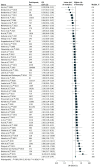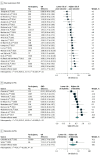Outcomes in Patients With Poststroke Seizures: A Systematic Review and Meta-Analysis
- PMID: 37721736
- PMCID: PMC10507596
- DOI: 10.1001/jamaneurol.2023.3240
Outcomes in Patients With Poststroke Seizures: A Systematic Review and Meta-Analysis
Abstract
Importance: Published data about the impact of poststroke seizures (PSSs) on the outcomes of patients with stroke are inconsistent and have not been systematically evaluated, to the authors' knowledge.
Objective: To investigate outcomes in people with PSS compared with people without PSS.
Data sources: MEDLINE, Embase, PsycInfo, Cochrane, LILACS, LIPECS, and Web of Science, with years searched from 1951 to January 30, 2023.
Study selection: Observational studies that reported PSS outcomes.
Data extraction and synthesis: The Preferred Reporting Items for Systematic Reviews and Meta-Analyses checklist was used for abstracting data, and the Joanna Briggs Institute tool was used for risk-of-bias assessment. Data were reported as odds ratio (OR) and standardized mean difference (SMD) with a 95% CI using a random-effects meta-analysis. Publication bias was assessed using funnel plots and the Egger test. Outlier and meta-regression analyses were performed to explore the source of heterogeneity. Data were analyzed from November 2022 to January 2023.
Main outcomes and measures: Measured outcomes were mortality, poor functional outcome (modified Rankin scale [mRS] score 3-6), disability (mean mRS score), recurrent stroke, and dementia at patient follow-up.
Results: The search yielded 71 eligible articles, including 20 110 patients with PSS and 1 166 085 patients without PSS. Of the participants with PSS, 1967 (9.8%) had early seizures, and 10 605 (52.7%) had late seizures. The risk of bias was high in 5 studies (7.0%), moderate in 35 (49.3%), and low in 31 (43.7%). PSSs were associated with mortality risk (OR, 2.1; 95% CI, 1.8-2.4), poor functional outcome (OR, 2.2; 95% CI, 1.8-2.8), greater disability (SMD, 0.6; 95% CI, 0.4-0.7), and increased dementia risk (OR, 3.1; 95% CI, 1.3-7.7) compared with patients without PSS. In subgroup analyses, early seizures but not late seizures were associated with mortality (OR, 2.4; 95% CI, 1.9-2.9 vs OR, 1.2; 95% CI, 0.8-2.0) and both ischemic and hemorrhagic stroke subtypes were associated with mortality (OR, 2.2; 95% CI, 1.8-2.7 vs OR, 1.4; 95% CI, 1.0-1.8). In addition, early and late seizures (OR, 2.4; 95% CI, 1.6-3.4 vs OR, 2.7; 95% CI, 1.8-4.1) and stroke subtypes were associated with poor outcomes (OR, 2.6; 95% CI, 1.9-3.7 vs OR, 1.9; 95% CI, 1.0-3.6).
Conclusions and relevance: Results of this systematic review and meta-analysis suggest that PSSs were associated with significantly increased mortality and severe disability in patients with history of stroke. Unraveling these associations is a high clinical and research priority. Trials of interventions to prevent seizures may be warranted.
Conflict of interest statement
Figures



References
-
- Misra S, Khan E, Funaro M, Quinn T, Mishra NK. Clinical outcomes in patients who have poststroke epilepsy: a systematic review and meta-analysis. Accessed March 27, 2023. https://www.crd.york.ac.uk/prospero/display_record.php?RecordID=308648
Publication types
MeSH terms
Grants and funding
LinkOut - more resources
Full Text Sources
Medical

